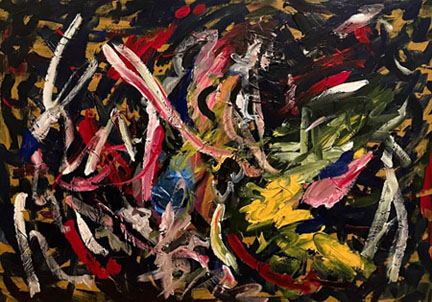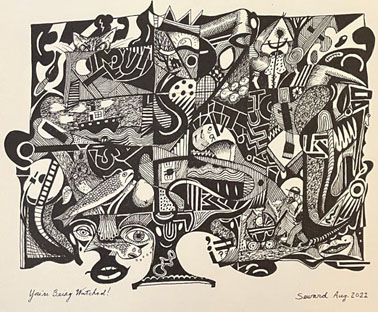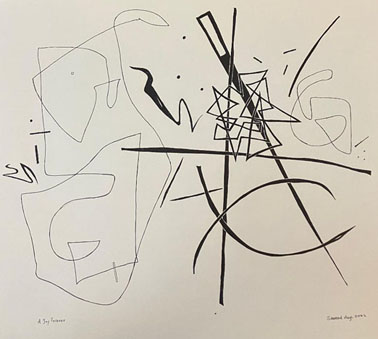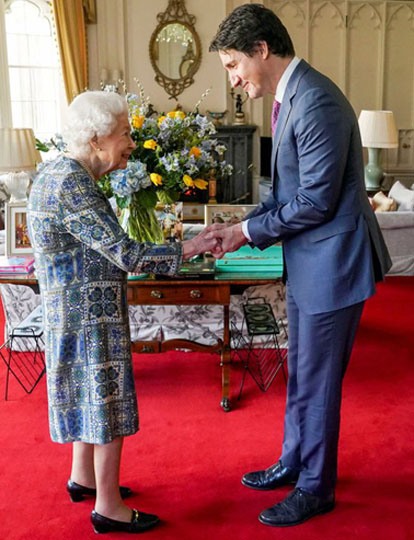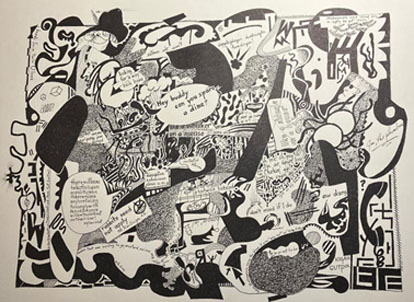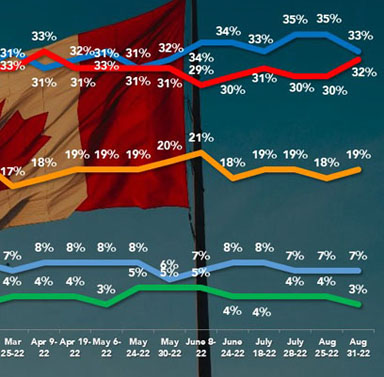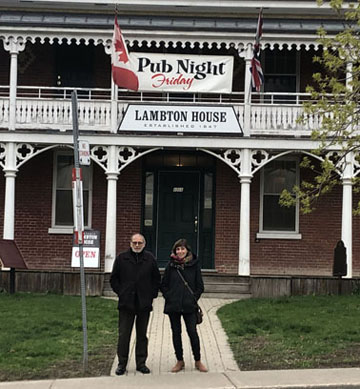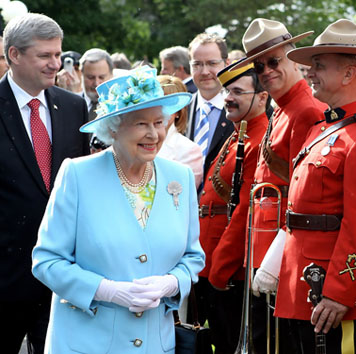Sovereignty Smith in Wild Rose Country & Trudeau Liberals/Singh NDP (& what the people think after much-loved Queen)
Sep 8th, 2022 | By Randall White | Category: In BriefONTARIO TONITE. RANDALL WHITE, FERNWOOD PARK, TORONTO, THURS SEP 8, 2022. [UPDATED SEP 10]. As the new fall cultural season begins, I seem to be contemplating two confusing but nonetheless intriguing stories in the news of the day/week/month etc :
(1) Lieut. Gov. Salma Lakhani & Danielle “Sovereignty” Smith in Wild Rose Country (and then suddenly today the Queen passes away at Balmoral Castle in Scotland)
News from Alberta is what keeps Ontario politics interesting. The leadership race voting process for the province’s governing United Conservative Party has already started (on September 2). The winner will be announced just under one month from today, on October 6.
If it’s Danielle Smith — and she is currently “the frontrunner candidate in the race to replace Jason Kenney as Alberta’s UCP leader and premier”— we denizens of the Canada-First most populous province should be girding our loins for some further crazy talk (and possibly even action?) about Alberta sovereignty. (On Ms Smith’s theory there are now two Canadian provinces that are “pas une province comme les autres.”)
The prospect has already prompted such local headlines as “Alberta Lt.-Gov. willing to block sovereignty act if it’s found unconstitutional … ‘We are a constitutional monarchy, and this is where we keep checks and balances,’ Salma Lakhani said. ‘I’m what I would call a constitutional fire extinguisher’” ; and “Danielle Smith says premier, Alberta Lt.-Gov. wrong to comment on sovereignty act … Smith accuses Jason Kenney of tipping the scales in favour of Travis Toews.”
Very briefly, the Lieutenant Governor of Alberta (analogous to the Governor General of Canada), Samla Lakhani (appointed, as is the current convention, by Prime Minister Justin Trudeau in August 2020) made some remarks on frontrunner candidate Smith’s proposed Alberta Sovereignty Act. As explained by CBC News : “Lakhani said she would consult with legal experts before giving royal assent to a potentially unconstitutional piece of legislation.”
An interesting report from Kieran Leavitt at the Toronto Star has noted that : “Alberta is one of the few places a lieutenant governor has made a decision like the one Smith is concerned about. In 1937, Lt.-Gov. John C. Bowen reserved giving royal assent to several bills until they could be reviewed by the Supreme Court … Alberta’s Social Credit government of the day had tried to pass laws that limited freedom of the press in the province and laws that infringed on federal jurisdiction over banks … The Supreme Court decided the bills were an overstep by the province, supporting Bowen’s rare decision.”
In 2022 it is Lieutenant Governor Lakhani’s allusion to her responsibilities as a de facto head of state in a Canadian provincial parliamentary democracy that might linger in the cross-Canada public mind : “I’m what I would call a constitutional fire extinguisher. We don’t have to use it a lot, but sometimes we do … We want to do the right thing for our people and for our Constitution.” The Lieutenant Governor “added it is critical Alberta uphold the rule of law … she has firsthand experience after she and others of South Asian origin were expelled from an authoritarian Uganda … ‘I appreciate very, very much the rule of law. I think we have to guard it and we have respect it and we also have to guard democracy. These are gifts’.”
Those of us who want the federal Governor General and provincial Lieutenant Governors to evolve into new non-monarchical heads of state in an independent parliamentary democratic republic might be struck by how Ms Lakhani almost seems to be anticipating this logical (and quite historically based) destiny for the 1867 confederation in Canada.
Similarly, one trouble with all 11 Governor General and Lieutenant Governor offices under the present “constitutional monarchy” is that they are filled by prime ministerial appointment — which reduces their credibility as high-minded ceremonial heads of state, not beholden to any partisan political philosophy of the moment.
The problem was underlined in a recent CBC News report on LG Lakhani’s public remarks : “Smith’s supporters have criticized Lakhani for her comments on the sovereignty act. Peter Guthrie, the UCP MLA for Airdrie-Cochrane, claimed that the federal Liberals were influencing Lakhani. Prime Minister Justin Trudeau named Lakhani to serve as Alberta’s lieutenant-governor in August 2020 … ‘It appears the Ottawa elites through Trudeau’s appointed representative are interfering in the UCP leadership race on a piece of legislation that hasn’t yet been written or debated in Alberta’s legislature,’ he said on Twitter.”
Such present-day parliamentary democratic republics similar to Canada as Germany, Iceland, India, and Ireland have more democratic methods of selecting their ceremonial heads of state than appointment by the prime minister. (A hangover from the still more colonial era 1867–1931, when UK prime ministers appointed governor generals!) And I’d certainly guess that something similar will happen in Canada — when it finally makes its ultimate transition to a parliamentary democratic republic through a constitutional amendment to what we now call the Constitution Act, 1867, after the reign of the current still widely enough admired British monarch Queen Elizabeth II comes to an end.
UPDATE SEP 10 : Several hours after this piece was posted on September 8, 2022, the Queen sadly passed away at her Scottish retreat in Balmoral, at the age of 96. Although Charles III has been proclaimed as King of Canada today by the Governor General (and Prime Minister), an April 2022 opinion survey from the Angus Reid Institute suggested that 67% of Canadians oppose recognizing “Prince Charles as King and Canada’s official head of state.”
We Canadians are polite and suitably respectful. It will no doubt take some time for the organization of a constitutional amendment on the issue supported by the federal and all provincial parliaments to take shape. But see, eg, such online reports immediately following the unhappy announcement from Balmoral as blogTO’s “People think Canada should leave the Commonwealth and become a republic” .(Though Canada could also become a republic and stay in the Commonwealth — like India and most other Commonwealth members today : and that is probably what will finally happen.)
(2) Canada doing better than some would have us believe (despite sadness of Justin Trudeau on September 8)
News may be quietly surfacing that the Trudeau Liberals (allied in an open-ended and strictly legislative but nonetheless formal way with the Singh New Democrats) are not doing quite as terribly in governing Canada as some would have the Canadian people believe.
According to a 20 August 2022 Condé Nast list of “the worst airports in the world for flight delays and cancellations,” during “the period of 27 May until 31 July 2022 … New York City’s airports ranked among the top 10 worst.” Meanwhile, “Canada’s Toronto Pearson airport comes in at 15th.” (From some local TV and other coverage I had the vague impression that Toronto Pearson was Number One — absolute worst in the world, thanks to Ottawa bungling!)
I have also heard complaints that the Government of Canada is not doing at all enough in Ukraine — far worse than most countries of its sort. Yet according to a 22 August 2022 Statista article, Canada is tied for eighth place on a list of “Countries Pulling Their Weight in Ukraine Aid.” (The US is in seventh and the UK in sixth place. All top five places are Baltic and Scandinavian countries close to Ukraine — and Russia — geographically.)
For evidence that something closer to the obvious enough truth about Canada’s performance in dealing with the various global struggles of the 2020s may be starting to move the wild world of Canadian democratic politics, see Abacus Data’s “national survey of 1,500 Canadian adults from August 26 to 30, 2022.”
Canada-wide the Conservatives are still one percentage point ahead of the Liberals in projected popular vote.
But the Liberals and New Democrats together (without any help from the Greens or Bloc Québécois) have a solid enough 51% — compared to only 33% for the Conservatives (or even 38% for Conservatives and People’s Party together).
Even more intriguingly (if not yet altogether significantly) the change between this late August poll and the next most recent Abacus Data survey earlier in August shows Conservatives losing two points, while Liberals gain two points, and New Democrats gain one.
And on a currently customary regional note, Liberals and New Democrats together outvote Conservatives (and the Conservatives and People’s Party together), in all provinces except for the Prairies (with special reference to Alberta and Saskatchewan).
For the moment, at any rate, this is the world into which the new leader of the Conservative Party of Canada will soon be inserted. Someone who grew up as a French Canadian born and raised in Calgary, Alberta may have a better chance than many think.
Or he may not. Especially if the next federal election really doesn’t happen until 20 October 2025 — as scheduled in the Liberal-NDP written agreement of March 22, 2022! And we might all remember this as we settle back to our various schools of life in a fateful fall etc …
UPDATE SEP 10 : And (though they will certainly go unnoticed in the real world in Ottawa) my commiserations to our prime minister, who first met Queen Elizabeth when he was five years old. (Some sources say seven.) Like others I was moved by his emotion when he told us on TV : “She was one of my favourite people in the world and I will miss her so.” The extent of Justin Trudeau’s relationship with the Queen became clearer earlier this year, when he visited her before others just after her recovery from COVID (which perhaps harmed her health more than we knew).
I think both Prime Minister Trudeau and the Liberal Party of Canada are making a mistake by not embracing the cause of the inevitable Canadian republic down the road — in the old Liberal tradition eg of the 1947 Canadian Citizenship Act and the 1965 Canadian flag and the 1982 Canadian Charter of Rights and Freedoms. And I take heart that New Democrat leader Jagmeet Singh has already said more sensible and (increasingly) broadly popular things on the future of the monarchy.
Yet like many others I respect and (I think) vaguely understand the particular special relationship between Queen Elizabeth II and her Canadian Prime Minister Justin Trudeau, son (and heir) of her earlier Canadian prime minister Pierre Trudeau.
However, if PM Justin Trudeau develops the same kind of relationship with the new King of Canada, son etc, who he has just today proclaimed (along with Governor General Simon )…. and who 67% of Canadians apparently rejected as “King and Canada’s official head of state” in an opinion poll as recently as this past spring … well in my view that just might change many things …
